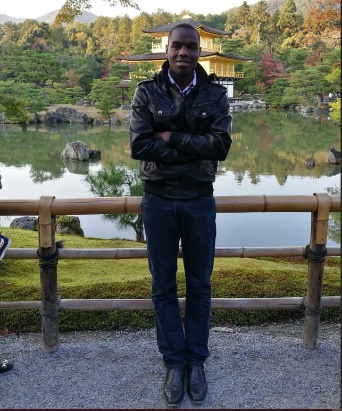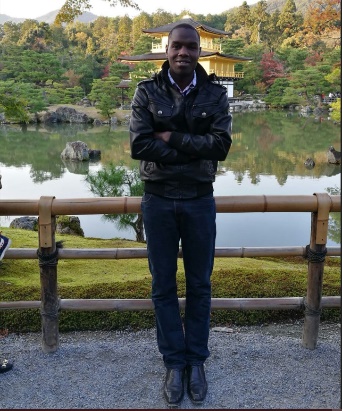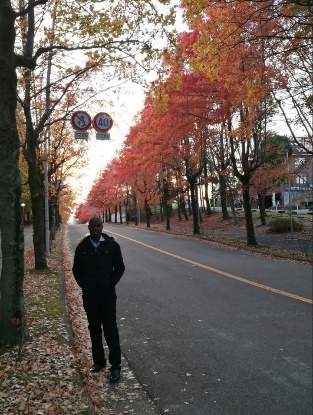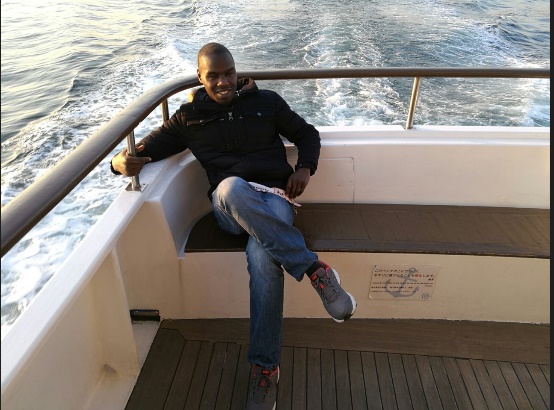We bring you the voices of JICA returnee students from Jomo Kenyatta University of Agriculture and Technology (JKUAT) in Kenya!
Interview with Dr. Benson Oyunge Mwangi, JICA returnee: On his current work at JKUAT after studying abroad with JICA
Name:Benson Oyunge Mwangi
Country of Origin:Kenya
Destination of study in Japan (name of University): Osaka University
Course: Maritime and Urban Engineering
Duration of your study: 5 years (ABE Initiative from Sep 2016 to October 2018, Mitsubishi Corporation scholarship for PhD from Oct 2018 to Sep 2021)
Present position: Lecturer

1. What have you been doing after completing your studies in Japan?
I teach students in various subjects (Fluid Mechanics, Control Engineering, Engineering Materials, Mechanics of Machines, etc.). I’m also a Departmental Examinations Officer and administering continuous assessment tests and exams to students. Also, I take part in development of new programs in the department.
I conduct research activities with my students and other member of staffs. And, I’m also a member and secretary to iPIC (Innovation Prototyping Integrated Centre) Sub Task Force of the AFRICA-ai-JAPAN Project (Phase2).
2. Reflecting back on your study experience in Japan, what was different from studying in Kenya? What was the benefit of studying in Japan, or why did you want to study in Japan?
The difference is that in Japan, the laboratory-based education is adopted whereas in Kenya it is not the case. This clearly defines the research theme of a laboratory and hence all students joining that laboratory will be handling topics under that research theme.
Some of the benefits of studying in Japan include, working under renowned and world class professors, access to state-of-the-art equipment and facilities. Because of this, Japan is home to advanced technologies, and it is second to none in terms of technological advancements. Also, the Japanese people are very kind and ready to help foreigners living in Japan and this made my life very comfortable in Japan.
3. What are some of the Japanese development experiences, techniques that you learned during your study in Japan, which relates to your country’s socio-economic development?
The Japanese people are very hardworking and honest. In all economic activities, be it at the rice fields, transport industry, waste management, hotels, and restaurants, etc., I saw the workers working hard and ensuring everything was in order. I believe this is what has put Japan ahead of many countries in terms of development. One thing I learnt while in Japan is that everyone keeps time, and this results in prompt and quality service delivery to the people.
4. How have you been utilizing your knowledge and expertise obtained during your study? How would you like to contribute to your country’s development?
I am teaching undergraduate students in the area of Fluid Mechanics, which is one of my subjects of interest. This has enabled me to put into perspective a lot of concepts applied in this subject. I am also able to advise students on their projects in the department. This gives them an opportunity to put into application the knowledge they have learnt in class. Once these students graduate, they are able to take up research activities in any topic in Fluid Mechanics as well as work in the industry. As they work in the industry, they contribute immensely in the growth and development of those industries and in turn the growth and development of our economy.
5. Have you faced or facing any challenges/difficulties in utilizing some of your knowledge and expertise obtained during your study in Japan back in Kenya?
If yes, how did you overcome those difficulties? Was your network with JICA scholar alumni or your Japanese professors useful?
One of the challenges is that we don’t have sophisticated equipment and facilities as the ones I used in Japan for my research. Therefore, in order to continue with my research, I decided to go into computer simulations which needs a powerful computer and softwares. These are less costly compared to the equipment and facilities for experiments. Thanks to JICA, I now have a Workstation which will help me a lot in conducting my computer simulation for my research. This will enable me to continue with my research.

Dr. Mwangi in Kyoto

Dr. Mwangi in Osaka

Dr. Mwangi in Kobe Bay




scroll